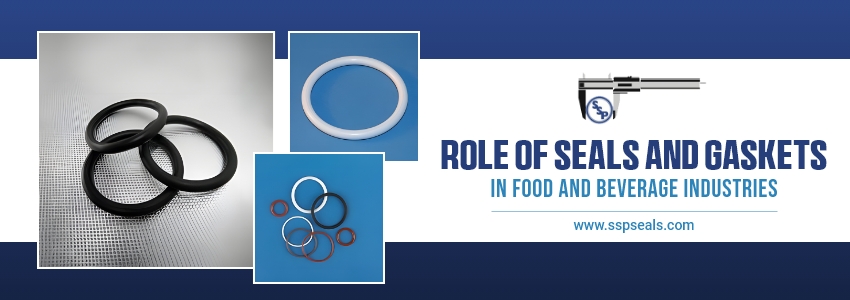How Seals and Gaskets Safeguard Food and Beverage Products?
Feb 05, 2025 Food Grade Seals
The safety of processes and equipment operations is paramount in the food and beverage industry. The quality and integrity of products must be maintained from the ingredients sourcing stage to the point where the final product reaches the consumer’s table. Hence, inspecting and maintaining processes and equipment including the smallest parts such as seals and gaskets is necessary. These small but essential food grade shaft seals play a key role in ensuring hygiene, preventing contamination, and maintaining the overall quality of food and beverages. Their function is integral to a seamless and safe production process, making them a key factor in the broader context of food safety and operational efficiency within the industry. This post highlights how seals and gaskets contribute to the safety of food products.

Role of Seals and Gaskets in Food and Beverage Production
Seals and gaskets are part of production, processing, packaging, and distribution equipment. These food and beverage seals serve as barriers that create a secure seal between two surfaces, preventing the passage of air, moisture, chemicals, or contaminants into food products. They also prevent leakages. The following pointers help you understand how they safeguard food and beverage products.
- Prevent Contamination:The primary goal of the seals and gaskets is to prevent contamination during production, storage, and transportation. These components act as barriers that protect food and beverages from harmful microorganisms, allergens, and external contaminants, ensuring product quality and safety. By creating tight, secure seals, they eliminate gaps or leaks where bacteria or airborne particles could infiltrate, helping to maintain hygiene standards and prevent spoilage, foodborne illnesses, or compromised products. Their role is especially vital for manufacturers aiming to produce allergen-free products and meet regulatory requirements which is crucial in the food industry.
- Prevention of Product Integrity:Seals and gaskets are essential for preserving the integrity of food and beverages by protecting them from environmental factors like light, oxygen, moisture, and high temperature, which can cause spoilage or degradation. In pasteurization, sterilization, and fermentation processes, these components maintain controlled environments critical to product quality and safety. If seals fail, temperature and pressure may not be properly regulated, potentially compromising the process and allowing pathogens to survive. In packaging, seals ensure airtight closures that prevent exposure to contaminants, extending the shelf life of products like juices, dairy, meats, and ready meals.
- Hygiene and Cleanliness Standards: Food safety regulations set by organizations such as the Food and Drug Administration (FDA), European Food Safety Authority (EFSA), and others require manufacturers to adhere to strict hygiene standards. Seals and gaskets are key in maintaining cleanliness by preventing contact between food and external contaminants. Made from food-grade materials like siliconea>, EPDM, and fluoropolymers, these components must meet safety certifications and ensure that harmful chemicals are not leached into the product. Designed for easy cleaning and high-pressure sterilization, seals and gaskets maintain hygiene and preserve the safety and integrity of food throughout production.
- Regulation Compliance and Traceability:The food and beverage industry is heavily regulated, with strict guidelines enforced by regulatory bodies to ensure consumer safety. Food grade seals are crucial in helping manufacturers comply with these standards by guaranteeing proper sealing of equipment and processes to avoid leakage and contamination. Additionally, certified food grade materials provide traceability throughout the supply chain, demonstrating adherence to safety and quality protocols and ensuring that production processes meet the required regulations.
- Leaks and Losses Prevention: In food and beverage manufacturing, leaks can result in product loss, contamination, and an unsanitary environment. Seals and gaskets prevent these issues by ensuring tight seals on equipment, minimizing waste, and safeguarding product quality. Additionally, sealing systems help retain flavors, preservatives, and carbonation, particularly in beverages like carbonated soft drinks and sparkling water, preserving their taste and fizz. In packaging for dairy and meat products, secure seals prevent spoilage and off-flavors caused by exposure to oxygen.
- Ensuring Food Safety During Transportation: Leaks in food and beverage manufacturing can result in product loss, contamination, and an unclean environment. Seals and gaskets prevent these issues by ensuring airtight equipment, minimizing waste, and safeguarding product quality. Sealing eliminates leakage and spillage issues of products during transportation and shipping. It also prevents direct exposure to the outside environment. In packaging for dairy and meat products, secure seals prevent spoilage and off-flavors caused by exposure to oxygen.

Considering such a significant role, you must source seals and gaskets from a reliable player in the industry. SSP Seals is a recognized provider of seals and gaskets for food and beverage equipment and packaging. They offer these food-grade seals in different materials, such as Virgin PTFE, Polyurethane, EPDM, Silicone, and Viton. They also provide FDA-approved custom seals for the food industry. If you need any further information or need to share your requirements, you can contact our experts via email at gm@sspseals.com Or +1 908-852-3125
Related Post
 sales:
gm@sspseals.com
Toll Free: +1-888-238-SEAL Request A Quote
sales:
gm@sspseals.com
Toll Free: +1-888-238-SEAL Request A Quote
